By Robert St. Martin
Hollywood, California (The Hollywood Times) 03/18/2024
Saturday at the Egyptian Theatre in Hollywood as part of a retrospective of films directed by Radu Jude hosted by the American Cinematheque was a special screening of the latest film of Romanian director Radu Jude – Do Not Expect Too Much from the End of the World (2023). This freewheeling essay/black comedy satirizes contemporary life from all angles – by providing an ideological critique of our past and current ideas of media. This film, speckled with literary quotations, jokes, cinephile sideswipes and references to Romania’s most notorious foreign resident: The misogynistic blogger Andrew Tate. Do Not Expect Too Much of the End of the World is Jude’s latest experimental comedy which recently won a Special Jury Prize in the International Competition selection at the Locarno Film Festival.
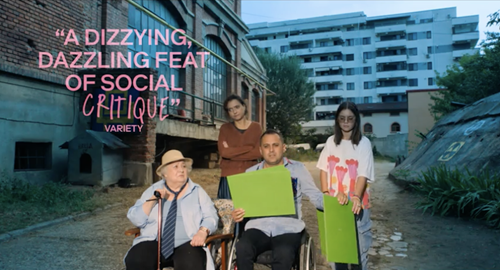
The action opens with a message saying that the film we’re about to watch is a conversation, or rather a dialogue, with an older Romanian film Angela Moves On (1981). This dialogue unfolds in a sort of one-two rhythm where, as we’re introduced to the contemporary state of affairs, we are immediately presented with a similar situation from the 1981 film, inviting us to contrast the differences and similarities between the two.
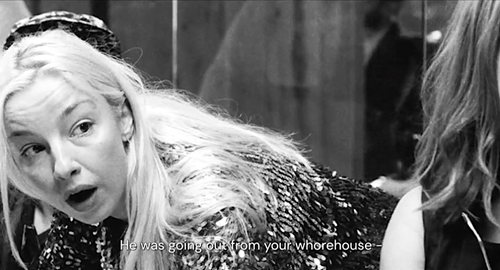
Both films follow two women named Angela. Angela (Dorina Lazar), from the 1981 film, is a taxi driver, going about her business as usual on – what, of course, only appears to be – a typically idyllic and sunny day in the Bucharest of the Ceaușescu era. Jude samples clips from a Ceaușescu-era Romanian film from 1981 entitled Angela Moves On, starring the now veteran Romanian actress Dorina Lazar as a taxi driver who finds herself in a relationship with one of her passengers. At one stage, Nina Hoss’s character marvels at the monolithic and grotesque “Ceauseșcu palace” in the middle of the city: the 1981 film has a scene set in the rather pleasant “Uranus” neighborhood that was razed just after that to make way for this colossal monument to the tyrant’s ego.
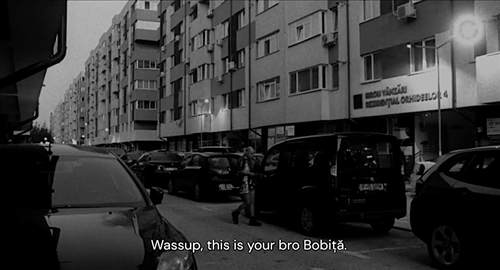
The main subject of the film is Angela (played brilliantly by Ilinca Manolache), a harassed and sleep-deprived production assistant for a Romanian film and video company in Bucharest – where a sign grimly announces it as a “martyred city.” Her employer, with whom she appears to have a short-term contract as negligible as the relationship between Uber driver and passenger, has a commission from a chilly Austrian business with branches in Romania whose diffident marketing director is played by German actress Nina Hoss.
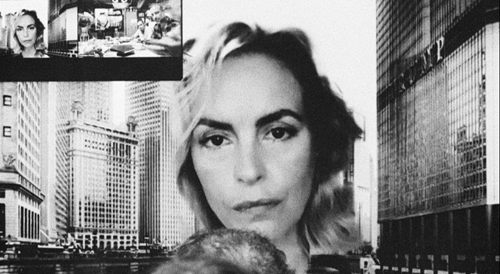
The Austrians want them to create a safety video, exhorting workers to wear safety clothing and equipment, containing a testimony from someone who has been disabled at work, and prepared to say on camera that it was all down to their failure to wear helmets etc. – in other words, to blame themselves rather than the bosses. Poor Angela must drive around endlessly and frantically, using her smartphone to audition disabled people who are prepared to do this in return for the promised thousand €1,000 fee.
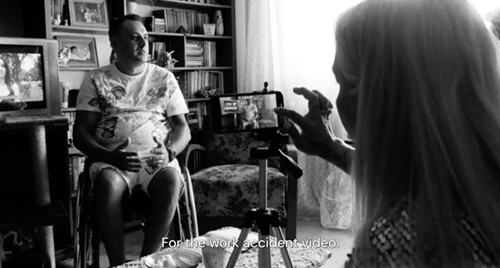
As luck would have it, her work will bring her to the house of ‘81 Angela, whose son, Ovidiu (Ovidiu Pîrsan) had an accident while working overtime for the company modern Angela is representing, paralyzing him from the waist down. On the one hand, he and his family need the money the company is offering for the video, but on the other hand, what they’re asking him to say for the cameras puts him in a position that means he is essentially admitting guilt for his accident, automatically absolving the company of any blame in the ongoing court case he has against them.
It is a miserable life for Angela, whose only pleasure is posting clips on TikTok where she pretends to be Andrew Tate: spewing misogynist bile and adoration for Vladimir Putin. She even gets to interview the cult German director Uwe Boll (playing himself) famous for his bad-taste pulp shockers and his loathing for snobby critics. These videos are in color; the rest of her life is in grainy monochrome.
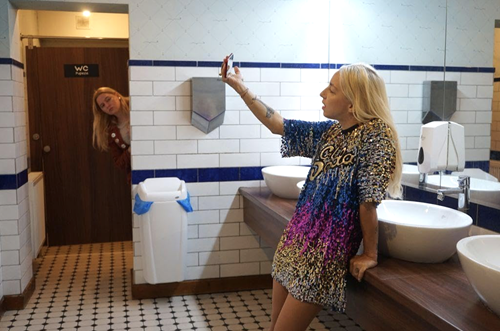
From Angela’s hobby of creating TikTok content under a male filter and a fake username of Bobitsa – an Andrew Tate-type, spreading misogynistic “red-pill sigma” messages (which is very much a heart of the film, hilariously performed by Ilinca Manolache) – to jokes about Godard’s assisted suicide and the appearance of Uwe Boll, making fun of both corporate elites and the working class etc. No one is safe here, which speaks of the chronic “flattening out” of the culture. The very title gives us the first clue. In a standard tentpole fare, “end of the world” is a standard currency, while here it’s nothing to write home about, boring like any other event.
In its dialogue with the ‘81 film, one notices that while both in the past, as well as in the present, propaganda is created to obfuscate reality, in the years past the facade was put up as a means of holding up a fake idyllic image. In the present time, the fake images characters put up are not out of keeping some semblances of nice reality but it’s either out of a profit motive, or just for the hell of it to feel something. That isn’t to say that Radu revels in this nihilism, on the contrary, everything comes out in this way because he cares too much.
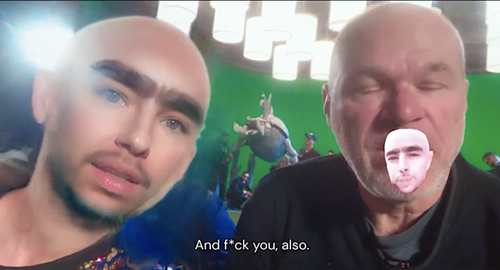
The film engages in dialogue with the ‘81 film as a way of ideological critique of what were, and to an extent still are, the mechanisms of obfuscating reality. Scenes are not just replayed, they are stretched out, zoomed in, even corrected to show the censorship. Hungarian names forcefully changed, Arab and Romani families hiding on the very edges of the frames – reduced to mere pixelated blobs, treated like mistakes in a film – a cutaway shot of a wrench next to the car gearshift, probably played as a joke in the original film, but the viewer can only assume why a woman taxi driver would always need a wrench at arm’s reach.
This dialogue is further emphasized by the withdrawal of most of the means of manipulation; be it by using only non-diegetic sources of music, contrasting of black-and-white DSLR footage with old film in color, opting for writing credits on paper as opposed to digital graphics, or even deliberately emphasizing mismatching cuts so as to draw attention to the fact that we’re watching a film, but also to drive a point home – all film is manipulation, and that manipulation is hiding in the most mundane places.
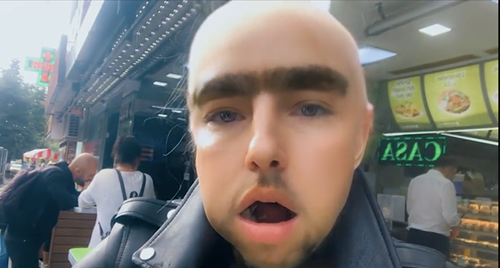
Actress Ilinca Manolache manages to make most of that time worthwhile while giving a striking and witty portrayal of sleep depravity, which is in itself a state where the sense of time is lost. Like sleep-deprived Angela in the film, we as viewers are forced to move along with her unending day – amidst the ideological critique and many encounters she experiences in this almost 3-hour-long film.





